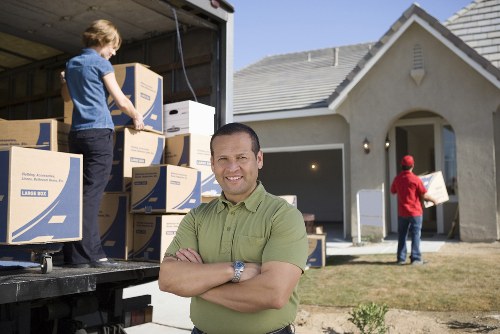White Goods Recycle Aldershot

Recycling white goods in Aldershot is an essential step towards a greener environment and sustainable living. White goods, such as refrigerators, washing machines, and dishwashers, are significant household appliances that, when discarded responsibly, can be repurposed or recycled to minimize environmental impact.
Proper recycling of these bulky items not only conserves valuable resources but also reduces the amount of waste that ends up in landfills. Aldershot offers various facilities and services to ensure that your old appliances are recycled efficiently and safely.
Understanding the benefits and processes involved in recycling white goods can help residents make informed decisions and contribute positively to their community's sustainability efforts.
Why Recycle White Goods?

Recycling white goods has numerous environmental and economic advantages. By recycling, we reduce the need for raw materials, thereby conserving natural resources and decreasing energy consumption.
Additionally, recycling helps in minimizing greenhouse gas emissions, which are a major contributor to climate change. Proper disposal of white goods ensures that harmful substances, such as refrigerants and metals, do not contaminate the environment.
Furthermore, recycling programs often create job opportunities and support the local economy. By participating in recycling initiatives, Aldershot residents can play a significant role in fostering a sustainable future.
Benefits for the Environment

The environmental benefits of recycling white goods are substantial. It helps in reducing landfill waste, which is crucial as landfills are a major source of methane emissions, a potent greenhouse gas.
Recycling also conserves energy, as producing new appliances from recycled materials typically requires less energy than manufacturing them from scratch. This energy conservation translates into lower carbon emissions, contributing to the fight against global warming.
Moreover, recycling initiatives prevent the release of toxic substances present in white goods, such as CFCs in refrigerators, ensuring that the air, soil, and water remain uncontaminated.
Economic Benefits

From an economic perspective, recycling white goods can lead to significant cost savings. By reusing existing materials, manufacturers can reduce production costs, which can, in turn, lower the prices of new appliances.
Additionally, recycling centers often charge lower disposal fees compared to landfill sites, making it a cost-effective option for households looking to dispose of old appliances.
Moreover, recycling initiatives can stimulate economic growth by creating jobs in the recycling and manufacturing sectors, benefiting the local community in Aldershot.
Types of White Goods

White goods encompass a variety of household appliances that are typically used for routine functions. Understanding the different types can help in the recycling process.
The most common white goods include refrigerators, washing machines, dishwashers, freezers, and ovens. Each of these appliances contains different materials that require specific recycling methods.
Additionally, smaller appliances like microwaves and small freezers also fall under the category of white goods and can be recycled through the same channels.
Refrigerators
Washing Machines
Dishwashers
How to Recycle White Goods in Aldershot

Recycling white goods in Aldershot is a straightforward process with various options available to residents. Whether you prefer drop-off services or scheduled pickups, there are multiple ways to ensure your old appliances are recycled responsibly.
The first step is to identify the type of white good you wish to recycle. This will determine the specific recycling method and the appropriate facility to handle the appliance.
Next, you can choose between utilizing local recycling centers, arranging for a pickup service, or contacting specialized recycling companies that operate within Aldershot.
Local Recycling Centers
 Local recycling centers in Aldershot are equipped to handle a variety of white goods. These centers accept appliances from residents and provide the necessary services to dismantle and recycle them properly.
Local recycling centers in Aldershot are equipped to handle a variety of white goods. These centers accept appliances from residents and provide the necessary services to dismantle and recycle them properly.Collection Services
 For added convenience, many Aldershot recycling services offer collection options. This service allows residents to schedule a pickup at their home, ensuring that bulky appliances are removed without any hassle.
For added convenience, many Aldershot recycling services offer collection options. This service allows residents to schedule a pickup at their home, ensuring that bulky appliances are removed without any hassle.
Steps to Follow
 Recycling your white goods involves several key steps:
Recycling your white goods involves several key steps:- Identify the appliance you wish to recycle.
- Contact a local recycling center or collection service.
- Prepare the appliance by removing any personal items and ensuring it is safe for transportation.
- Arrange for drop-off or pickup at the designated facility.
- Ensure that the recycling process complies with local regulations.
Local Regulations and Guidelines
 Aldershot has specific regulations and guidelines in place to manage the recycling of white goods effectively. These rules are designed to ensure that the recycling process is safe, environmentally friendly, and in compliance with national standards.
Aldershot has specific regulations and guidelines in place to manage the recycling of white goods effectively. These rules are designed to ensure that the recycling process is safe, environmentally friendly, and in compliance with national standards.
Compliance
Permits and Licensing
Tips for Preparing White Goods for Recycling
 Preparing your white goods for recycling can make the process smoother and more efficient. Here are some essential tips to follow before recycling your appliances.
Preparing your white goods for recycling can make the process smoother and more efficient. Here are some essential tips to follow before recycling your appliances.- Clean the Appliance: Remove all food residues, liquids, and personal items from the appliance to prevent contamination and facilitate the recycling process.
- Disconnect Properly: Ensure that the appliance is disconnected from the power source and, if applicable, from water lines.
- Remove Accessories: Take out any removable parts such as shelves, drawers, and racks. These components can often be recycled separately.
- Flatten if Possible: For certain appliances, flattening or disassembling can save space and make transportation more efficient.
- Label Correctly: If you are dropping off the appliance at a recycling center, label it with any required information to streamline the processing.
Environmental Impact of Recycling White Goods
 Recycling white goods significantly reduces environmental impact by conserving resources, minimizing waste, and decreasing pollution.
Recycling white goods significantly reduces environmental impact by conserving resources, minimizing waste, and decreasing pollution.The extraction and processing of raw materials for new appliances require substantial energy and resources. By recycling existing white goods, the demand for new materials decreases, leading to energy savings and reduced environmental degradation.
Moreover, recycling helps in managing hazardous materials safely, preventing them from entering the ecosystem and harming wildlife and human health.
Overall, the environmental benefits of recycling white goods contribute to a more sustainable and healthier planet.
Cost and Fees Associated with Recycling
 While recycling white goods offers numerous benefits, there are often costs associated with the process. Understanding these costs can help you make informed decisions about recycling your appliances.
While recycling white goods offers numerous benefits, there are often costs associated with the process. Understanding these costs can help you make informed decisions about recycling your appliances.- Recycling Fees: Some recycling centers charge a fee for processing bulky or hazardous items. These fees cover the costs of safe disposal and material recovery.
- Pickup Charges: If you opt for a collection service, there may be additional charges based on the size and type of appliance.
- Incentives and Rebates: In some cases, local authorities or recycling programs offer incentives or rebates to encourage recycling, helping to offset the costs.
Alternatives to Recycling
 While recycling is the most environmentally friendly option, there are alternatives available for disposing of white goods. These options should be considered carefully to minimize environmental impact.
While recycling is the most environmentally friendly option, there are alternatives available for disposing of white goods. These options should be considered carefully to minimize environmental impact.- Donation: If the appliance is still in working condition, consider donating it to a charity or a community organization.
- Resale: Selling or listing the appliance for free can give it a second life and keep it out of the landfill.
- Repurposing: Some white goods can be repurposed for other uses within your home or community.
Community Initiatives in Aldershot
 Aldershot is home to various community-driven recycling initiatives that aim to promote sustainable living and proper disposal of white goods.
Aldershot is home to various community-driven recycling initiatives that aim to promote sustainable living and proper disposal of white goods.Local non-profits and environmental organizations often organize recycling drives and awareness campaigns to educate residents about the importance of recycling white goods.
These initiatives provide resources and support to make recycling accessible and convenient for everyone in the community.
By participating in such programs, Aldershot residents can contribute to a cleaner and more sustainable environment.
Nearby Areas to Aldershot
 Aldershot is surrounded by several nearby areas that also offer white goods recycling services. Understanding the proximity and unique features of these areas can help residents find the best recycling options.
Aldershot is surrounded by several nearby areas that also offer white goods recycling services. Understanding the proximity and unique features of these areas can help residents find the best recycling options.- Camberley: Located just a few miles from Aldershot, Camberley provides various recycling centers equipped to handle white goods efficiently.
- Farnborough: Known for its robust recycling programs, Farnborough offers collection services and drop-off points for bulky appliances.
- Fleet: Fleet's recycling facilities are well-maintained, ensuring safe and responsible recycling of white goods.
- Bagshot: Bagshot residents can access nearby recycling centers that specialize in handling different types of white goods.
- Blackwater: Blackwater offers convenient recycling options, including scheduled pickups and easy drop-off locations.
- Yateley: Yateley's recycling centers are equipped to manage a variety of appliances, making it a viable option for residents.
- Woking: Woking provides comprehensive recycling services, including the recycling of large household appliances.
- Chobham: Chobham's recycling initiatives include programs specifically designed for white goods, ensuring efficient processing.
- Frensham: Frensham residents have access to local recycling centers that prioritize environmental sustainability.
- Hartley Wintney: Hartley Wintney offers both collection and drop-off services for white goods, making recycling accessible.
- East Meon: East Meon's recycling facilities support the community by providing safe disposal options for appliances.
- Blackmore: Blackmore's recycling centers are dedicated to minimizing waste and promoting resource conservation.
- Church Crookham: Church Crookham features several recycling options, including services tailored for white goods.
- Odiham: Odiham offers efficient recycling services, ensuring that white goods are handled responsibly.
Conclusion
 Recycling white goods in Aldershot is a beneficial practice for both the environment and the community. By understanding the processes, benefits, and available services, residents can make informed choices that contribute to sustainability and reduce waste.
Recycling white goods in Aldershot is a beneficial practice for both the environment and the community. By understanding the processes, benefits, and available services, residents can make informed choices that contribute to sustainability and reduce waste.Whether you choose to recycle, donate, or repurpose your old appliances, taking responsible action ensures that you are part of a collective effort to protect our planet and promote a healthier, more sustainable future.
Embracing recycling initiatives not only helps in preserving natural resources but also fosters a sense of community and shared responsibility among Aldershot residents.
Frequently Asked Questions

1. What are white goods?
White goods refer to large household appliances such as refrigerators, washing machines, dishwashers, and ovens, typically finished in white or neutral colors.
2. How can I recycle my old refrigerator in Aldershot?
You can recycle your old refrigerator by contacting local recycling centers or scheduling a pickup service through Aldershot's recycling programs. Ensure you follow the preparation steps for safe recycling.
3. Are there any costs associated with recycling white goods in Aldershot?
Some recycling centers may charge a fee for processing large appliances, while others might offer free recycling services. It's best to check with your chosen recycling facility for specific information.
4. Can I donate my working appliances instead of recycling them?
Yes, if your appliances are still in good working condition, you can donate them to local charities or community organizations, giving them a second life and reducing waste.
5. What should I do with small appliances like microwaves?
Small appliances can be recycled through the same facilities that handle white goods. Alternatively, consider donating or repurposing them if they are still functional.